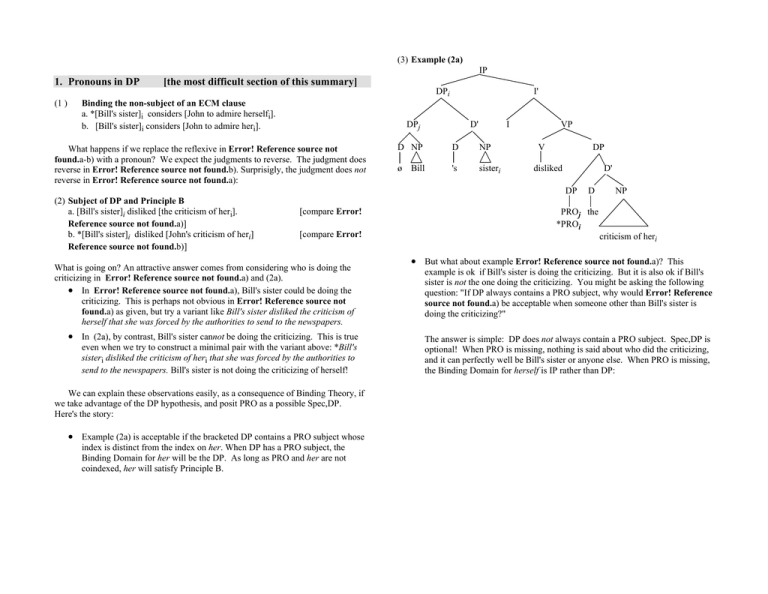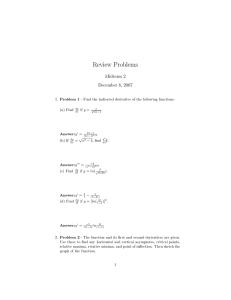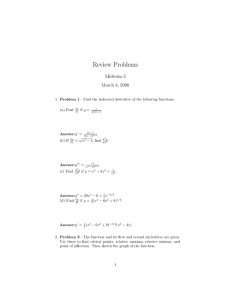1. Pronouns in DP
advertisement

(3) Example (2a) IP 1. Pronouns in DP (1 ) [the most difficult section of this summary] Binding the non-subject of an ECM clause a. *[Bill's sister]i considers [John to admire herselfi]. b. [Bill's sister]i considers [John to admire heri]. DPi I' DPj What happens if we replace the reflexive in Error! Reference source not found.a-b) with a pronoun? We expect the judgments to reverse. The judgment does reverse in Error! Reference source not found.b). Surprisigly, the judgment does not reverse in Error! Reference source not found.a): D' I D NP D NP ø Bill 's sisteri VP V DP disliked D' DP (2) Subject of DP and Principle B a. [Bill's sister]i disliked [the criticism of heri]. Reference source not found.a)] b. *[Bill's sister]i disliked [John's criticism of heri] Reference source not found.b)] [compare Error! [compare Error! What is going on? An attractive answer comes from considering who is doing the criticizing in Error! Reference source not found.a) and (2a). • In Error! Reference source not found.a), Bill's sister could be doing the criticizing. This is perhaps not obvious in Error! Reference source not found.a) as given, but try a variant like Bill's sister disliked the criticism of herself that she was forced by the authorities to send to the newspapers. • In (2a), by contrast, Bill's sister cannot be doing the criticizing. This is true even when we try to construct a minimal pair with the variant above: *Bill's sisteri disliked the criticism of heri that she was forced by the authorities to send to the newspapers. Bill's sister is not doing the criticizing of herself! We can explain these observations easily, as a consequence of Binding Theory, if we take advantage of the DP hypothesis, and posit PRO as a possible Spec,DP. Here's the story: • Example (2a) is acceptable if the bracketed DP contains a PRO subject whose index is distinct from the index on her. When DP has a PRO subject, the Binding Domain for her will be the DP. As long as PRO and her are not coindexed, her will satisfy Principle B. D NP PROj the *PROi criticism of heri • But what about example Error! Reference source not found.a)? This example is ok if Bill's sister is doing the criticizing. But it is also ok if Bill's sister is not the one doing the criticizing. You might be asking the following question: "If DP always contains a PRO subject, why would Error! Reference source not found.a) be acceptable when someone other than Bill's sister is doing the criticizing?" The answer is simple: DP does not always contain a PRO subject. Spec,DP is optional! When PRO is missing, nothing is said about who did the criticizing, and it can perfectly well be Bill's sister or anyone else. When PRO is missing, the Binding Domain for herself is IP rather than DP: -2(4) A structure for example Error! Reference source not found.a) with no PRO in DP IP DPi plural interpretation often found with the pronoun one as in One should never do syntax problems on an empty stomach: (5) What could John do? [PRO to call Mary for assistance] would be ridiculous. (6) It is hard [PRO to do syntax problems on an empty stomach] I' DPj D' I D NP D NP ø Bill 's sisteri PRO in DP has similar properties: VP V DP disliked D' D NP the criticism of herselfi At this point you should be able to figure the whole thing out for yourself. But in case you're lazy, here's the full story. Error! Reference source not found.a) [Bill's sister]i disliked [the criticism of herselfi]. If DP has PRO: If PRO is controlled by Bill's sister, reflexive is ok. If DP lacks PRO: The criticizer may be anyone. The reflexive is ok.1 (2a) [Bill's sister]i disliked [the criticism of heri]. If DP has PRO: If PRO is not controlled by Bill's sister, the pronoun is ok. If DP lacks PRO: The criticizer may be anyone. The pronoun is * with index i. 2. Uncontrolled PRO One final queston. For (2a), we noted that the pronoun is ok if PRO is not controlled by Bill's sister. But if it is not controlled by Bill's sister, what is it controlled by? In fact, though PRO is often the target of subject control or object control, in some circumstances, it gets its interpretation in other ways. For example, in (5), PRO takes as its antecedent John in the previous sentence. In (6), PRO is "arbitary" -- a generic 1 Note that tis means that if the criticizer is understood to be Bill's sister, we can't tell whether there is a PRO or not -- because either way the structure satisfies Binding Theory. This is not a problem, but it would be nice to find a way to verify this observation. (7) What could John do? [PROi the criticism of himselfi] had taken longer than he had anticipated. (8) [PRO ø criticism of oneselfi ] is healthy in moderation. ...to be continued next week.



